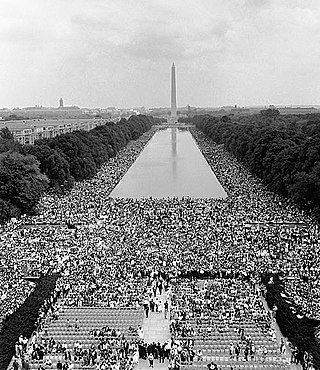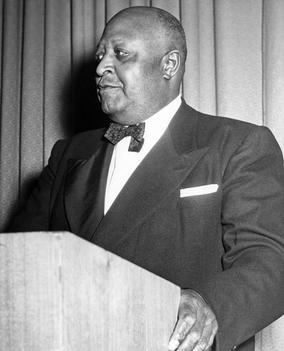
The civil rights movement was a social movement and campaign from 1954 to 1968 in the United States to abolish legalized racial segregation, discrimination, and disenfranchisement in the country. The movement had its origins in the Reconstruction era during the late 19th century and had its modern roots in the 1940s, although the movement made its largest legislative gains in the 1960s after years of direct actions and grassroots protests. The social movement's major nonviolent resistance and civil disobedience campaigns eventually secured new protections in federal law for the civil rights of all Americans.

Bayard Rustin was an African-American leader in social movements for civil rights, socialism, nonviolence, and gay rights.

The Student Nonviolent Coordinating Committee was the principal channel of student commitment in the United States to the civil rights movement during the 1960s. Emerging in 1960 from the student-led sit-ins at segregated lunch counters in Greensboro, North Carolina, and Nashville, Tennessee, the Committee sought to coordinate and assist direct-action challenges to the civic segregation and political exclusion of African Americans. From 1962, with the support of the Voter Education Project, SNCC committed to the registration and mobilization of black voters in the Deep South. Affiliates such as the Mississippi Freedom Democratic Party and the Lowndes County Freedom Organization in Alabama also worked to increase the pressure on federal and state government to enforce constitutional protections.

The Congress of Racial Equality (CORE) is an African-American civil rights organization in the United States that played a pivotal role for African Americans in the civil rights movement. Founded in 1942, its stated mission is "to bring about equality for all people regardless of race, creed, sex, age, disability, sexual orientation, religion or ethnic background."

Asa Philip Randolph was an American labor unionist and civil rights activist. In 1925, he organized and led the Brotherhood of Sleeping Car Porters, the first successful African-American-led labor union. In the early Civil Rights Movement and the Labor Movement, Randolph was a prominent voice. His continuous agitation with the support of fellow labor rights activists against racist labor practices helped lead President Franklin D. Roosevelt to issue Executive Order 8802 in 1941, banning discrimination in the defense industries during World War II. The group then successfully maintained pressure, so that President Harry S. Truman proposed a new Civil Rights Act and issued Executive Orders 9980 and 9981 in 1948, promoting fair employment and anti-discrimination policies in federal government hiring, and ending racial segregation in the armed services.

The March on Washington for Jobs and Freedom, also known as simply the March on Washington or The Great March on Washington, was held in Washington, D.C., on August 28, 1963. The purpose of the march was to advocate for the civil and economic rights of African Americans. At the march, final speaker Dr. Martin Luther King Jr., standing in front of the Lincoln Memorial, delivered his historic "I Have a Dream" speech in which he called for an end to racism and racial segregation.

James Morris Lawson Jr. is an American activist and university professor. He was a leading theoretician and tactician of nonviolence within the Civil Rights Movement. During the 1960s, he served as a mentor to the Nashville Student Movement and the Student Nonviolent Coordinating Committee. He was expelled from Vanderbilt University for his civil rights activism in 1960, and later served as a pastor in Los Angeles for 25 years.

The National Urban League, formerly known as the National League on Urban Conditions Among Negroes, is a nonpartisan historic civil rights organization based in New York City that advocates on behalf of economic and social justice for African Americans and against racial discrimination in the United States. It is the oldest and largest community-based organization of its kind in the nation. Its current President is Marc Morial.

Founded in 1925, The Brotherhood of Sleeping Car Porters and Maids, commonly referred to as the Brotherhood of Sleeping Car Porters (BSCP), was the first labor organization led by African Americans to receive a charter in the American Federation of Labor (AFL). The BSCP gathered a membership of 18,000 passenger railway workers across Canada, Mexico, and the United States.
The civil rights movement (1896–1954) was a long, primarily nonviolent action to bring full civil rights and equality under the law to all Americans. The era has had a lasting impact on American society – in its tactics, the increased social and legal acceptance of civil rights, and in its exposure of the prevalence and cost of racism.

Executive Order 8802 was signed by President Franklin D. Roosevelt on June 25, 1941, to prohibit ethnic or racial discrimination in the nation's defense industry, including in companies, unions, and federal agencies. It also set up the Fair Employment Practice Committee. It was the first federal action, though not a law, to promote equal opportunity and prohibit employment discrimination in the United States. Executive Order 8802 represented the first executive civil rights directive since Reconstruction.

The Big Six—Martin Luther King Jr., James Farmer, John Lewis, A. Philip Randolph, Roy Wilkins and Whitney Young—were the leaders of six prominent civil rights organizations who were instrumental in the organization of the March on Washington for Jobs and Freedom in 1963, at the height of the Civil Rights Movement in the United States.
The Chicago Freedom Movement, also known as the Chicago open housing movement, was led by Martin Luther King Jr., James Bevel and Al Raby. It was supported by the Chicago-based Coordinating Council of Community Organizations (CCCO) and the Southern Christian Leadership Conference (SCLC). The movement included a large rally, marches, and demands to the City of Chicago. These specific demands covered a wide range of areas besides open housing, and included quality education, transportation and job access, income and employment, health, wealth generation, crime and the criminal justice system, community development, tenants rights, and quality of life. Operation Breadbasket, in part led by Jesse Jackson, sought to harness African-American consumer power. The Chicago Freedom Movement was the most ambitious civil rights campaign in the North of the United States, lasted from mid-1965 to August 1966, and is largely credited with inspiring the 1968 Fair Housing Act.
Roger L. Green is an American legislator who served in the New York State Assembly for 26 years, from 1981 to 2007, representing District 57 which, allowing for redistricting adjustments, has primarily comprised the New York City borough of Brooklyn neighborhoods Fort Greene, Clinton Hill, Prospect Heights, Park Slope and Bedford-Stuyvesant. He was the first Muslim member of the Assembly.
The National Negro Congress (NNC) was an American organization formed in 1936 at Howard University as a broadly based organization with the goal of fighting for Black liberation; it was the successor to the League of Struggle for Negro Rights, both affiliated with the Communist Party. During the Great Depression, the party worked in the United States to unite black and white workers and intellectuals in the fight for racial justice. This period represented the Party's peak of prestige in African-American communities. NNC was opposed to war, fascism, and discrimination, especially racial discrimination. During the Great Depression era, a majority of Americans faced immense economic problems. Many lost their jobs and as a result, were forced to live at the margins of society. The crisis highlighted inequities for many African Americans, who were unemployed at higher rates than white.
The March on Washington Movement (MOWM), 1941–1946, organized by activists A. Philip Randolph and Bayard Rustin was a tool designed to pressure the U.S. government into providing fair working opportunities for African Americans and desegregating the armed forces by threat of mass marches on Washington, D.C. during World War II. When President Roosevelt issued Executive Order 8802 in 1941, prohibiting discrimination in the defense industry under contract to federal agencies, Randolph and collaborators called-off the initial march.

Tom David Kahn was an American social democrat known for his leadership in several organizations. He was an activist and influential strategist in the Civil Rights Movement. He was a senior adviser and leader in the U.S. labor movement.

Milton Price Webster was an American trade unionist, best remembered as the first vice president of the Brotherhood of Sleeping Car Porters and leader of its Chicago division. As the union's lead negotiator, Webster was influential in securing a collective bargaining agreement with the Pullman Company – the first national contract won by any black-led American trade union.
Workers for the Scripto company in Atlanta, Georgia, United States, held a labor strike from November 27, 1964, to January 9, 1965. It ended when the company and union agreed to a three-year contract that included wage increases and improved employee benefits. The strike was an important event in the history of the civil rights movement, as both civil rights leaders and organized labor activists worked together to support the strike.
Small organizations associated with the Socialist Party of America have served as schools for the leadership of social-movement organizations, including the civil rights movement and the sixties radicalism. These organizations are now chiefly remembered because of their members' leadership of large organizations that directly influenced the United States and international politics. After 1960, the party also functioned "as an educational organization" and "a caucus of policy advocates on the left wing of the Democratic Party".












